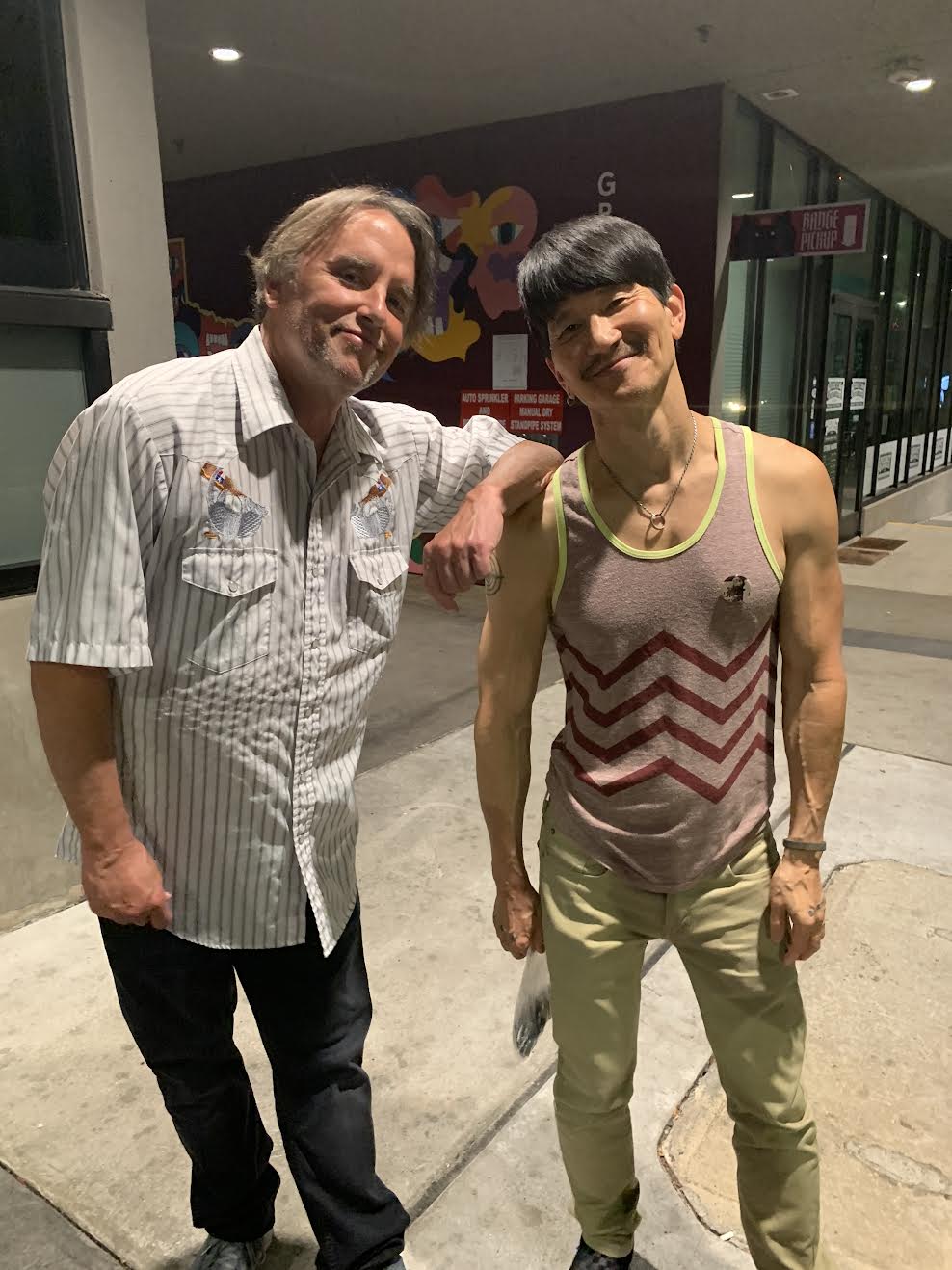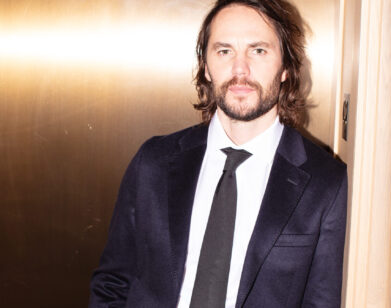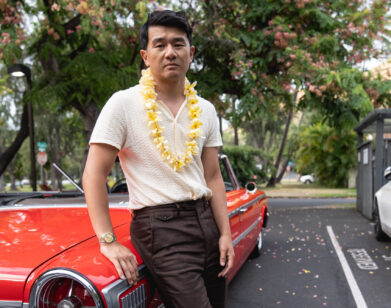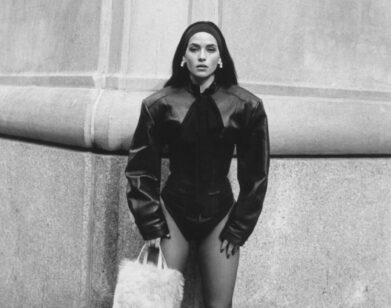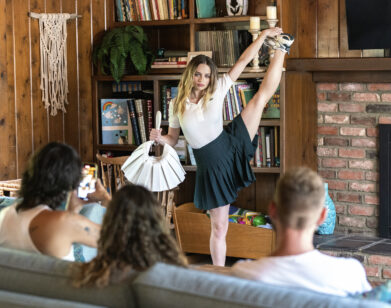NYFF
“You’re a Freak, Too”: Gregg Araki, in Conversation with Richard Linklater
The decades spent scrounging for pirated versions of Gregg Akari films has passed, and a new generation of fans has arrived, along with 4K restorations of his cult classics, Nowhere and Doom Generation. Richard Linklater can confirm—his 19-year-old daughter has a Nowhere tattoo on her leg. “I swear my kids say that’s the cultural exchange they have to know if you’re cool or not,” he told Araki on Zoom last week while touring the fall festival circuit with his own new feature, Hit Man.
For years, Araki’s films were criminally hard to find, or were otherwise seen in suboptimal quality. “They were looking at the shittiest, crappiest versions of the movies that just literally make my skin crawl,” says Araki, whose glossy new restorations by Strand Releasing were shown at the Academy Museum last month. “So it’s great that we have new versions that are just sparkling brand new.” But he and Linklater, whose new film was acquired by Netflix for $20 million out of TIFF, are reasonably torn about the state of movies—from the slow death of the theatrical experience to the suffocation of a critical establishment. But, as Araki says, “We can’t just be the old guys complaining about new films and the kids.” So, before the New York Film Festival, they got on a call together to muse about making movies in the eighties, Linklater’s latest, the bustling black market for all things Araki, and why filmmaking might just be “healthier” nowadays.
———
GREGG ARAKI: Rick!
RICHARD LINKLATER: How’s it going? Gregg’s whole life now is being honored everywhere he goes.
ARAKI: I guess that’s what happens when you’re old enough.
LINKLATER: You live long enough and it’s like, “Here’s an award for still being alive.”
ARAKI: How are you, Rick?
LINKLATER: Good. Good.
ARAKI: It looks like you’re in like a rural version of 2001 or something.
LINKLATER: I’m in my woodshed. This is my library.
ARAKI: It looks like a fancy woodshed. Holy shit, that’s awesome.
LINKLATER: Look, I made a stained glass window.
ARAKI: That’s so cool.
LINKLATER: That’s where I spend my life.
ARAKI: And you designed that too?
LINKLATER: Yeah.
ARAKI: That’s fucking amazing. You and Ethan [Hawke] were working on your thing last week, your secret thing?
LINKLATER: Yeah.
ARAKI: Oh, sorry. Should I even mention that?
LINKLATER: I’m always working on a few things, so I don’t really know. Doesn’t matter if they’re secret, no one cares.
ARAKI: I saw Ruby Rich last night. She did the Q&A for our Nowhere screening at IFC Center. And she was saying that you’re shooting something in Paris?
LINKLATER: Oh, not yet. I’m hoping to make a film over there.
ARAKI: That’s fucking fantastic.
LINKLATER: Yeah, in French. It’s like a New Wave film.
ARAKI: Do you have French actors and stuff?
LINKLATER: I hope to.
ARAKI: I’ve always had a dream about shooting in France because my movies are so loved in France. They love auteurs over there. But I don’t like to leave the house. It’s so crazy that I’m actually in New York. And you’re on your way here, right, for New York [Film] Festival?
LINKLATER: Yeah, I’m coming up there pretty soon. Congrats on the new 4K of Nowhere. It is really beautiful. So you had a screening last night?
ARAKI: Yeah, we’ve actually had four in the last two days and it’s been crazy. The kids turned out in droves. I always ask how many people in this audience have never seen the movie before and it’s always at least half. And it’s so crazy to me, these kids and this new audience and how they found out about it. That’s one of the things I’m so thrilled about is that both these movies [Doom Generation and Nowhere] have lived for decades with this intense following of devoted fans. But they were looking at the shittiest, crappiest versions of the movies that just literally make my skin crawl. So, because we were able to go back to the original negative and remix all the sound, it’s now what I want it to look like after I’m gone. As a filmmaker, [you] can’t look at every fucking copy, every print, and there’s copies of the movies floating around that are just so shitty. You know what I mean? It’s just really horrifying that work can be remembered in that way. So it’s great that we have new versions that are just sparkling brand new and look beautiful and sound amazing.
LINKLATER: But what’s more exciting is that there’s a whole new generation that wasn’t even born that are loving the movie. One of my 19-year-olds has a fucking Nowhere tattoo on their calf. You’re corrupting another generation, just so you know.
ARAKI: I was going to suggest that your kid be on this call with us. I thought that would be fun.
LINKLATER: I’ve got a question. Like Slowdive, are musicians asked the question constantly the way we are, “Well, has streaming ruined…” We’re forced to talk about how our industry’s changed and I feel like the old guy keeping kids off your yard going, “It was better in my day.” Is it like that in music? Are they put in a similar situation?
ARAKI: Yeah, it must be. Because that’s the thing, in the eighties and nineties when we were young whippersnappers, there were record companies and record deals and CDs and sales. You would get a soundtrack deal and we used to use the advance to pay for music licenses. Even for a little movie like Nowhere, we got a decent soundtrack deal, so we were able to clear a whole bunch of music using that money. I know that when we were doing my show Now Apocalypse, in 2018 or 2019, the licensing fees have gone up and they’re really like, “We need this fucking money.” Because this is how we make money now. We don’t sell CDs. It’s not about record sales, it’s literally about, “How much can you pay us to use this song for two minutes in your movie?” So the fees are intense.
LINKLATER: Oh, I know. I did a film, Apollo 10 1/2, and it was set in ’69, so I had this wonderful soundtrack and it was so expensive. It was Netflix, so there’s no backend deal. They’re like, “Oh, Netflix? Fuck you, pay me.” And then at the end of the day, I was like, “Oh, this would be a great double or triple vinyl album.” They’re like, “Oh no, we don’t do that anymore. We’ll publish a Spotify list of the songs and people can listen.” It’s not even a soundtrack, dude.
ARAKI: I know. When we were at the IFC Center the other night, some kid brought up a cassette of the Nowhere soundtrack. I’ve signed so many CDs, DVDs, cigarette packs, I’ve signed everything. And this kid brought up a cassette of the Nowhere soundtrack. Where did you find this shit? Literally me and Jimmy [Duvall] were like, “What? I’ve never seen this.”
LINKLATER: I’ve got two words for you: eBay. Or that’s one word.
ARAKI: Yeah, it’s crazy. And now he has a signed one of those and it’s just like $10,000 or something.
LINKLATER: Well, you need to start your own little shadow business of selling cassettes and crap like that. So are we supposed to be talking about something culturally relevant?
ARAKI: Well, let’s talk about it now. I’m so interested in the genesis of this project. And you just made a giant deal at Netflix, which also touches on what we were talking about.
LINKLATER: I’m rolling my eyes when I hear that. I don’t know, I felt like it was old school. It was this script I wrote on spec with my lead actor, Glen Powell, based on a magazine article by a friend of mine in Texas Monthly I always thought was funny from 20 years ago. It felt like we were making this in the nineties or something. We started showing it at the festivals. It got a wonderful response.
ARAKI: That’s totally old-school. And it’s so much work, especially this year with the SAG Strike, your actors weren’t there to get photographed and all that shit. So it’s like you’re literally marketing and selling the movie on your own. And the reaction was so ecstatic and so amazing. I knew you were going to get a big sale.
LINKLATER: Doesn’t it feel weird that people are looking back fondly now, “Oh, the nineties was the last great indie.” But if you lived through it, remember how all we did was bitch and complain?
ARAKI: Well, that’s in Dazed [and Confused] when you’re like, “Oh, this decade fucking sucks. The next one is going to be so much fucking better.”
LINKLATER: Never forget, things always suck in the present moment no matter what’s going on in the world.
ARAKI: But now there’s such nostalgia for the nineties.
LINKLATER: Yeah, the eighties and nineties were fun. I think that’s what your movies capture so well, the angst and anger.
ARAKI: Well, we’ve been talking about this a lot on this Nowhere press tour. One of the things that makes Nowhere and Doom special is they do have that angst and that anger and that fucking confusion of being young and all that. But because of the influence of punk rock, new wave music, there’s a level of fun and joy.
LINKLATER: Yeah. I always go, “First off, they’re really funny!”
ARAKI: There’s fun and there’s joy and there’s exhilaration the same way of going to a punk rock or new wave show. It’s a fun time as opposed to something like Euphoria, which is the sex and the drugs and the nihilism and all that, but it’s miserable. There’s no joy.
LINKLATER: There’s a bummer veil over everything. It’s like, “No, you’re supposed to be having fun, especially when you’re young.” What the fuck are you guys doing?
ARAKI: Somebody was talking about Nowhere once [as] “The young, the beautiful, and the damned.” But you’re going to look back on these years and go, “Jesus Christ, what was I thinking? I was fucking 20. I’m fucking gorgeous.”
LINKLATER: Yeah, you look at your pictures like, “Look at that body. No wonder we were getting laid.”
ARAKI: It’s like the male character says in Nowhere. “We’ve got to have as much sex and love as we can while we’re young and pretty and everybody wants us. Because we’re going to be old and ugly one day.”
LINKLATER: Yeah, you’re going to be old and ugly. What else?
ARAKI: So you were talking about Netflix. Well, I guess you can’t say anything bad about them ’cause they’re your home. I guess the good news about Netflix is it goes to everybody, right?
LINKLATER: Yeah, that’s their pitch. 250 million subscribers. That sounds good. And if you think about it, for most of our films, the afterlife is really where most people see it.
ARAKI: Yeah, exactly. I ask that question a lot. “How many people saw Doom Generation in the theater?” And literally it’s like, three people.
LINKLATER: You want to have a good final resting place where people can find it. And Netflix, they’ll do a theatrical [release] to whatever degree. So you hope the hardcores who really want to see it with an audience get out there that week or two or three. The theatrical experience is so important to guys like us.
ARAKI: It’s like the church-like experience of going to the movies. It’s just a whole different thing. And the idea being that you are in thrall this spectacle, as opposed to looking at your laptop like, “Oh, I’ve got to get a sandwich.”
LINKLATER: It’s so weird. I feel so torn. On one hand, this was a dream when you’re sitting there in the eighties trying to find a movie. There’s the Criterion Channel now. You can just watch it. If there’s one thing different now, it’s just obviously the availability is everywhere, but if someone had told you, you wouldn’t be spending your time in a record store the way you used to, or a bookstore. And I think technology goes toward people’s wants like, “Hey, that song you just heard, just push a button and you can listen to the song 12 seconds later instead of going and looking for it in a used record store.”
ARAKI: It would take hours and hours and hours. But it’s such a double-edged sword because it’s like, yeah, it’s amazing. You want to see a Kieslowski movie or something, you just push a button and you’re watching it. But the flip side of that is, and it’s kind of maybe what kids are looking for when they’re going to Slowdive concerts or going to Nowhere or seeking out Dazed and Confused, it’s the idea of the search and the effort. When you find it, it’s like a treasure. It’s something that you cherish. Now everything’s homogenized and everything’s the same. It’s so hard to find that thing that is somewhat precious or special.
LINKLATER: I think we’re in the halfway point where everything just gets downloaded in our brains directly. If you don’t have the human experiential element to it, like, “Oh, I looked for that album for years and then I found it at a record store,” or “we all got in a car and drove 70 miles to go to that movie that was only playing in that one theater.” That’s an experience. You’re not going to forget that. But if it’s always there and you watched it on your living room couch, there’s no personal memory to it outside the “content” of it. It’s just like, I don’t know, where’s the personal experience in it? Then there are things like, “Do you like Gregg Araki movies?” I swear my kids say that’s the cultural exchange they have to know if you’re cool or not.
ARAKI: How did your kid find out about Nowhere?
LINKLATER: I don’t know. Just from their circles.
ARAKI: If you make something that’s different enough, that’s unique enough, it becomes so special to somebody. But I do think that’s getting harder and harder in the world we live in, where you can see every single thing anytime.
LINKLATER: Do you think you could get those same movies made today? I mean, it’s not like anyone’s doing anything remotely like those films. Would someone green light those today?
ARAKI: Well, I’m working on a new movie now that’s not exactly like those movies, but kind of the same cloth, so I hope so.
LINKLATER: Yeah, exactly.
ARAKI: How many people Doom Generations were there back in the fucking nineties? Not that many. Both Doom Generation and Nowhere were financed by a French company. It’s not like Harvey Weinstein knocking people out of the way.
LINKLATER: You know what? We have that in common for guys of our generation. I don’t think Harvey crossed either of our paths. I had one meeting with that guy. He was creepy and I knew I would not work well with him. That was my takeaway.
ARAKI: So you’re on your way to New York next, right?
LINKLATER: Yeah, I’ve got two more film festivals this fall. We had signed up for those even before we had a distributor, but it’s hard to say no to the New York Film Festival.
ARAKI: You’re doing London too?
LINKLATER: Yeah.
ARAKI: Now that’s fun. As I said, everybody’s out. Todd Haynes is screening tonight in New York. We’re all still doing our thing.
LINKLATER: I was just thinking about how, when we started out, how few films were being made when we made our first films. We both made two no-budget films in our twenties in the eighties, right?
ARAKI: Not even the nineties. The eighties.
LINKLATER: How weird was it to be making a feature film in the eighties? There were just so few being made.
ARAKI: A lot of it was Strangers Than Paradise, which was 1984. And Chan Is Missing and She’s Gotta Have It. You can make that little indie movie with no money and a lot of blood, sweat, and tears. There were these forerunners to us. Before that, of course, there was John Waters, but it was a lot of work to make an independent feature on 16 millimeter. It’s just so labor intensive that you had to be a little delusional and crazy.
LINKLATER: And obsessive.
ARAKI: Yeah, you had to be obsessive. It was literally everything to me. I wasn’t really in a relationship and I didn’t have much. It was just my thing. My reason for living was doing these fucking movies. The money I spent was on film stock and processing and shit like that. Every waking hour was devoted to figuring out how I was going to do this, when we were going to shoot next. Now it’s so much easier with phones and fucking editing software and just post-production sound stuff that you don’t have to have that level of just basic insanity to do it.
LINKLATER: Is that a good thing? I think it separates the people of our generation who did it. You’re obsessed, but you get a little older and you go, “Well, that’s not normal behavior.”
ARAKI: It’s like a compulsion. You’re like, “I could eat, or I could buy some film stock.” I met Gus Van Sant in the late eighties when I was with Three Bewildered People and he was there with Mala Noche. That’s why we’re all friends and there’s this network of us today, because when you meet each other, it’s your tribe. You know what I mean? You’re like, “Oh, we’re the same. We’re all crazy. We’re all just obsessed with filmmaking.”
LINKLATER: “You’re a freak, too.”
ARAKI: We’re all the same level of freak, and we all have the same battle stories of like, “Oh, yeah, remember that day the camera fell out of the car and somebody died?”
LINKLATER: Because you knew that anyone had to have chewed off a paw to get there. I think maybe it’s healthier now.
ARAKI: It’s healthier.
LINKLATER: I want to think it’s a better world for people. I don’t know. I just don’t want to be complaining about the new. I gave one of those interviews where I was talking about my movie and I went off.
LINKLATER: “He said cinema is dead.”
ARAKI: I read a clickbait on you. It’s like, “Rick Linklater loved Barbie. He saw it three times.” I was like, “Really, this is your story? You’re talking to fucking Rick Linklater and you want to talk about Barbie?”
LINKLATER: Yeah, they get you on the red carpet, and it’s that last question in an interview where you’re just in a mood and you tell them the truth, but it’s not the gist of what you’re talking about. Like when you say, “Oh, yeah, indie cinema’s lost.” And someone’s, “Oh, I didn’t think you were so pessimistic about it.”
ARAKI: Another thing that’s missing from contemporary cinema and independent cinema these days is the critical establishment. Back in those days, there was writing about cinema and there were critics, there’d be Village Voice, Timeout, you’d do LA Weekly. There were these pieces written about cinema and there was this level of excitement and discourse that amplified the movies. The Living End probably would’ve been lost forever because it’s just this little indie movie that costs like $25,000 and showed for three weeks at the Angelica or something. But it was part of a bigger cultural moment, which was criticism and movie critics and think pieces and press and media. Now, that doesn’t exist anymore. It’s like fucking clickbait about you liking Barbie.
LINKLATER: Yeah, yeah. There were these outlets that were very curious about what was going on in the avant-garde and the underground. And at some point, I don’t know if it’s just Hollywood or capitalism in general, the equation became, “Well, that thing’s small, no one’s going to see it anyway.” Instead of amplifying this cool thing. It doesn’t qualify to be written about in our pages because it’s just not culturally relevant. And I think indie cinema has fallen prey to that. You don’t see a lot of serious writing about.
ARAKI: So pessimistic, Rick.
LINKLATER: Shitting on everything.
ARAKI: It’s true, though. Also, there are still film critics, and there are obviously still reviews, but there’s this level of exhaustion amongst critics where it’s just like, “Oh God, another fucking movie to watch.” Because everybody is getting bombarded, including critics, with 10,000 fucking things. We’re both in the WGA and the DGA and the Academy and all that shit. And it’s fucking award season, so here comes the fucking tidal wave of 10,000 fucking movies that all want your attention. And it’s actually the critics’ lives every fucking day, so there’s this level of weariness. And I think that is an unfortunate byproduct of this world that we live in.
LINKLATER: There’s so much on the table. I mean, there’s narratives. We just had books, movies, and TV was its own thing. Now there’s narrative games, there’s VR, so many good podcasts, TikTok, and it is just coming at you.
ARAKI: We can’t just be the old guys complaining about new films and the kids.
LINKLATER: Yeah, no. I think it’s great. We always wanted to communicate and for people to express themselves, and boy, that’s what we’re getting.
ARAKI: That’s an optimistic note to end on.
LINKLATER: That’s the good news.

